
At the USGLC, we are leading advocates of the International Affairs Budget (IAB), so one of the first things we discuss with our interns is the importance of these programs for America’s global leadership in development and diplomacy around the world. At just 1% of the total federal budget, IAB programs are a strategic investment in advancing our country’s health, economic, and security interests. They play a critical role in responding to humanitarian crises, tackling global health challenges, and preventing conflict, among many other vital activities. Moreover, international affairs funding from Congress is responsible for supporting agencies and programs that include the State Department, the U.S. Agency for International Development (USAID), the Peace Corps, and global health and foreign assistance.
Each semester, we recruit an ambitious team of interns to help advocate for American diplomacy and development around the world, including the international affairs funding that supports U.S. global engagement. As a capstone of the internship experience, our interns dive into different aspects of the budget, researching an international affairs program of their own choosing and subsequently presenting their findings to the entire USGLC staff. Not only do our interns learn more about these impactful endeavors, but they also hone professional skills like research, writing, presenting, and public speaking that will be useful in future career settings.
In their own words below, and in no particular order, our spring and summer intern classes of 2022 provide highlights of their presentations, demonstrating the range and versatility of U.S. international affairs programs and how their funding is critical to supporting people around the world and Americans at home.
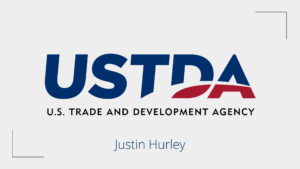 The U.S. Trade and Development Agency (USTDA) helps companies create U.S. jobs through the export of U.S. goods and services for priority infrastructure projects in emerging economies. Since its founding in 1992, USTDA has facilitated more than $76 billion in U.S. exports supporting 4,000 infrastructure activities in 139 countries. To achieve its mission, the Agency funds project preparation and partnership building activities with partner countries. Project preparation includes funding feasibility studies, technical assistance, and pilot projects – all conducted by U.S. firms. By integrating U.S. private sector innovation into infrastructure projects at the critical early stages, when design choices and technology options are determined, U.S. export potential is raised substantially during project implementation.
The U.S. Trade and Development Agency (USTDA) helps companies create U.S. jobs through the export of U.S. goods and services for priority infrastructure projects in emerging economies. Since its founding in 1992, USTDA has facilitated more than $76 billion in U.S. exports supporting 4,000 infrastructure activities in 139 countries. To achieve its mission, the Agency funds project preparation and partnership building activities with partner countries. Project preparation includes funding feasibility studies, technical assistance, and pilot projects – all conducted by U.S. firms. By integrating U.S. private sector innovation into infrastructure projects at the critical early stages, when design choices and technology options are determined, U.S. export potential is raised substantially during project implementation.
USTDA’s results are remarkable. During the most recent 10-year evaluation period, USTDA assessed that $117 in U.S. exports were facilitated for every $1 invested in its programming, a record return for the Agency. Their work is an incredible return on investment for the American taxpayer. Additionally, emerging economies gain access to the best American technology and business practices in their key infrastructure projects. This includes modernizing hospitals, advancing broadband connectivity, and developing renewable energy capacity with American private sector partners.
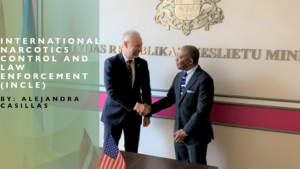 The Bureau of International Narcotics and Law Enforcement (INL) operates within the U.S. Department of State. It was created in 1978 and originally named the Bureau of International Narcotic Matters for the purpose of combatting drug trafficking into the United States from Latin America. The Bureau’s mission quickly expanded its activities and was renamed in 1995 to the INL present today. The Bureau describes its mission as the following: “INL works to keep Americans safe by countering crime, illegal drugs, and instability abroad.
The Bureau of International Narcotics and Law Enforcement (INL) operates within the U.S. Department of State. It was created in 1978 and originally named the Bureau of International Narcotic Matters for the purpose of combatting drug trafficking into the United States from Latin America. The Bureau’s mission quickly expanded its activities and was renamed in 1995 to the INL present today. The Bureau describes its mission as the following: “INL works to keep Americans safe by countering crime, illegal drugs, and instability abroad.
The INL operates in dozens of countries across the globe, implementing unique approaches in numerous regions to help partner governments strengthen their criminal justice institutions, combat transnational crime and corruption, and tackle illicit drug challenges. To effectively battle these challenges, the INL utilizes tools including foreign assistance, multilateral engagement, joint diplomacy, rewards, and sanctions. Crucial to the INL’s success is its partnerships. The Bureau works with international organizations such as the World Bank, the United Nations Office on Drug and Crime (UNODC), and Interpol to promote international ethics. The INL also partners with U.S. local, state, and federal agencies to support foreign criminal justice and law enforcement initiatives. Criminal justice initiatives often entail the INL and its partners, strengthening criminal defense efforts, building capacity to combat intricate crimes, and even improving the overall judicial sector. Lastly, the Bureau partners with non-governmental organizations to communicate with and consider public opinion in INL-related activities.
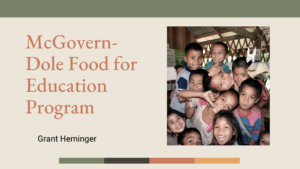
The McGovern-Dole International Food for Education and Child Nutrition Program was established as a U.S. Department of Agriculture Foreign Agricultural Service program through a bipartisan congressional effort in 2002 in order to help support education, childhood development, and food security in low-income, food-deficit countries around the world. The program does this by providing for the donation of U.S. agricultural food, as well as financial and technical assistance, to support school feeding and maternal and child nutrition projects. The primary objective of the program is to reduce hunger and improve literacy and primary education, especially for girls by providing school meals, teacher training, and related support to boost school enrollment and academic performance. They have also begun programs to improve children’s health and learning capacity before they enter school by offering nutrition programs for pregnant women and infants.
Since its inception in 2002, the U.S. Congress provides funding for the McGovern-Dole International Food for Education and Child Nutrition Program. After a substantial cut in FY19, the program has steady increased and then maintained funding around $230 million annually. This year, the House passed a FY23 budget of $265 million, a 12% ($28 million) increase compared to the FY22 enacted level and the largest increase since FY20. The McGovern-Dole International Food for Education Program draws its strength from strategic partnerships with non-profits and NGOs and works with these organizations to implement life-changing projects around the world.
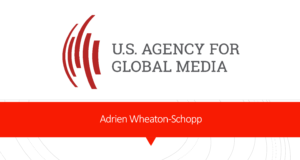
The U.S. Agency for Global Media (USAGM) embodies America’s diplomatic interest to uphold values of democracy and freedom of press throughout the world. The Agency’s initial efforts began during World War II before officially developing into U.S civilian broadcasting thanks to the birth of Voice of America, the state-owned international radio broadcaster of the U.S., in February 1942. Today, USAGM boasts six international news entities that work to provide objective information to victims of authoritarian regimes and press censorship around the world. With vastly different audiences, USAGM’s responsibility is to tailor its method of transmission depending on the circumstances through new mobile media, television and satellite, and radio, as well as by providing anti-censorship technology.
As USAID Administrator Samantha Power’s most recent foreign policy address emphasized, barely 20% of the world’s population lives in what Freedom House, a non-profit dedicated to championing the advancement of freedom globally, designates as a free country. One essential part of fighting against this pressing democratic backsliding is supporting freedom of press. As the question of democracy continues to dominate international public discourse, the U.S Agency for Global Media plays a vital role in leading the search for solutions by educating and inspiring people all around the world.

The Embassy Security, Construction, and Maintenance (ESCM) portion of the International Affairs Budget fulfills the Foreign Service Buildings Act of 1926, which is intended to preserve, maintain, repair, and design facilities owned or leased by the U.S. Department of State. It also encompasses the Bureau of Overseas Building Operations (OBO) and the Worldwide Security Upgrades Program (WSU).
The OBO focuses on providing the U.S. State Department with secure, safe, and functional diplomatic and consular missions that represent the United States in the receiving or host state. To safely carry out U.S. foreign policy objectives, thousands of U.S. government employees from 30 agencies rely on these facilities at over 280 locations. After September 11, 2001 and several terrorist attacks on U.S. embassies, the WSU was implemented to provide greater security in case of future attacks. It is responsible for enhancing perimeter security measures. Continued investment for the ESCM aids in displaying global American leadership and advancing U.S. interests by securing U.S. facilities at all levels.
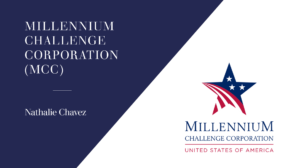
The Millennium Challenge Corporation (MCC) is a U.S. foreign assistance agency that receives funding from the International Affairs Budget. Founded in 2004, this relatively new agency is already making a significant impact. MCC has strict criterion for countries it works with, going through a competitive selection process for countries with per capita gross national income (GNI) below $1,965 or between $1,966-$4,095. The MCC enforces such strict criterion because it wants to ensure that countries it partners with “are committed to good governance, economic freedom, and investing in their people.” In recent years, the agency has seen increases in its funding from Congress in allocated amounts. In FY20, it received $905 million, $912 million in both FY21 and FY22, and the Administration requested $930 million for FY23.
Countries MCC has partnered with include Burkina Faso and Benin in Africa. In Burkina Faso, MCC led an agriculture development initiative that was completed in 2015. Through this project, MCC was able to support the construction of 2,240 hectares of irrigated farmland, the training of 7,850 farming households, and $2.8 million in loans to small and medium-sized enterprises in the country. In Benin, MCC is leading an off-grid electricity initiative that aims to deliver electricity to two-thirds of the population and has thus far delivered power for the first time to over 83,000 people. MCC’s work in communities around the world contributes to USGLC’s mission of promoting development and diplomacy abroad. As such, it highlights the importance of the International Affairs Budget and the role of the United States in creating a safer, more prosperous world.
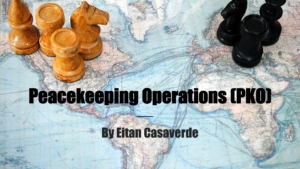
Through the International Affairs Budget, the Peacekeeping Operations Account (PKO) provides funding for all non-UN multilateral peacekeeping and regional stability operations. The PKO distributes the funds abroad to international coalitions or countries neighboring the nation that requires these operations. The PKO account additionally finances the development of peacekeeping programs in other countries interested in international peace efforts. Once the budget is finalized by the legislative and executive branches, the Department of State manages the allocation of these funds with assistance from both the Defense Department and regional commanders. From there, the Department of Defense typically implements these decisions and distributes the funds.
Over the course of the last decade, one of the most prominent case studies involving the utilization of PKO funding is the ongoing U.S. involvement in Somalia. These funds continue to be applied towards stabilization and peacekeeping in Somalia, as well as aiding the efforts in combating al-Shabaab, a Somali-based insurgent group that has led terrorist activities throughout Eastern Africa for decades. The budget for this specific account has varied in the past several years, with shifts often correlating with changes in the Administration. For FY23, the Biden Administration requested $464 million for the PKO account, which is a 1.07% decrease from last year’s request of $469 million, yet a 1.98% increase from the $455 million enacted for the account in FY22.
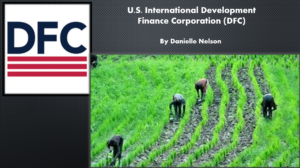
The Better Utilization of Investments Leading to Development (BUILD) Act of 2018 established the United States International Development Finance Corporation (DFC) by combining the Overseas Private Investment Corporation (OPIC) and the Development Credit Authority. The DFC focuses on expanding global development, advancing U.S. foreign policy, and generating returns for American taxpayers. Investment priorities include climate, global health, gender equity, information and communication technology (ICT), and inclusive growth.
Since its inception in 2019, the DFC’s portfolio authorization has steadily increased, providing resources to the DFC which strengthen programs and partnerships, bolster organizational capacities, and help maintain a fiscally responsible organization. Working with the private sector, the DFC mobilizes investment, which acts as a stabilizing force in countries with low- or lower-middle-income economies. The agency has over $37 billion in total active commitments, from the Indo-Pacific to Central America, and works closely with local partners to address issues specific to each region. These partnerships with local stakeholders not only better assist the people the DFC exists to serve, but they also promote regional security and stability in the region.
For more information about the International Affairs Budget, visit our Budget Center.
For more information about USGLC’s internship program, visit our Internships page.